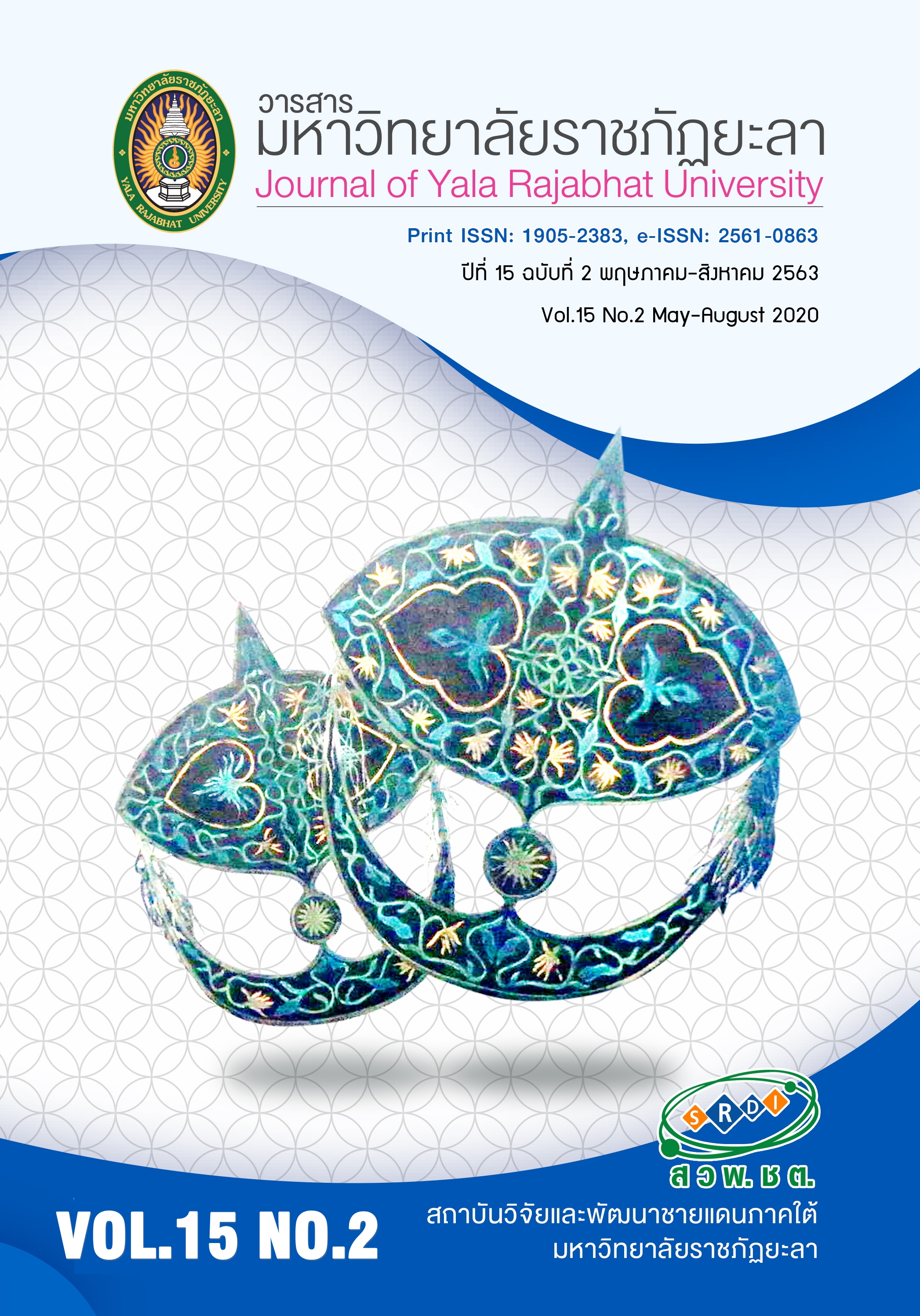รัฐศาสตร์เหมือนกับวิทยาศาสตร์หรือ?
Main Article Content
บทคัดย่อ
บทความนี้จะได้กล่าวถึงสถานะทางความรู้ของรัฐศาสตร์ที่ได้รับอิทธิพลจากวิทยาศาสตร์ธรรมชาติโดยแบ่งเป็น 4 ส่วน คือ การแสวงหาความรู้ของมนุษย์ พัฒนาการของศาสตร์และนิยาม ประเด็นโต้แย้งเกี่ยวกับความเป็นศาสตร์และอภิปรายปัญหาการนำระเบียบวิธีแบบวิทยาศาสตร์มาใช้ในการศึกษาทางสังคมศาสตร์ และความเป็นศาสตร์ของสังคมศาสตร์ ซึ่งพบว่ารัฐศาสตร์นั้นต่างจากวิทยาศาสตร์ธรรมชาติทั้งในด้านภววิทยา ญาณวิทยาและวิธีการศึกษา ผู้ศึกษาทางรัฐศาสตร์จึงไม่ควรยึดติดกับระเบียบวิธีเชิงปริมาณเพียงอย่างเดียว แต่ควรพิจารณาเลือกใช้ระเบียบวิธีให้เหมาะสมกับบริบทและเนื้อหาสาระและให้ความสนใจกับการศึกษาเชิงคุณค่าและระเบียบวิธีเชิงคุณภาพมากขึ้น
Article Details
บทความ ข้อมูล เนื้อหา รูปภาพ ฯลฯ ที่ได้รับการเผยแพร่ในวารสารมหาวิทยาลัยราชภัฏยะลานี้ ถือเป็นลิขสิทธิ์ของวารสารมหาวิทยาลัยราชภัฏยะลา หากบุคคลหรือหน่วยงานใดต้องการนำทั้งหมดหรือส่วนหนึ่งส่วนใดไปเผยแพร่ต่อหรือกระทำการใดๆ จะต้องได้รับอนุญาตเป็นลายลักษณ์อักษรจากวารสารมหาวิทยาลัยราชภัฏยะลาก่อนเท่านั้น
เอกสารอ้างอิง
Almond, G. (1990). A dicipline divided: schools and sects in politcal science. Newburry Park: Sage. (Chap.1)
Bowornwattana, B. (2005). Public administration theory and approach (1887-1970). (12th ed.). Bangkok: Chulalongkorn University Press. (in Thai)
Bruce, K. (2014). George Elton Mayo, in Witzel, M. and Warner, M. (2014). The Oxford Handbook of Management Theorists, New York: Oxford University Press. (Chap.6)
Bunchua, K. (1978). Introduction of philosophy. (2nd ed.). Bangkok: Thai Wattana panich. (in Thai)
Buranrom, S. (1999). Science for quality of life. Bangkok: Third wave Education. (in Thai)
Charoensin-o-larn, C. (2008). Critical political science. (3rd ed.). Bangkok: Thammasat University Press. (in Thai)
Dokbua, F. (2012). Greek philosophy. (3rded.). Bangkok: Siam Paritasana. (in Thai)
Flyvbjerg, B. (2003). In Ard-am, O (Trans). Making social science matter: why social inquiry fails and how it can succeed again?. Nakornpathom: Institute for Population and Social Research, Mahidol University. (Original work published 2001). (in Thai)
Fuller, S. (2018). A quantum leap for social theory, in Journal for the theory of social behavior, 48(2), USA: John Wiley & Sons.
Royal Society. (1999). Royal society dictionary. Bangkok: NanMee Books Publication. (in Thai)
Yavaprabhas, S. (2001). Public administration research. (4th ed.). Bangkok: Faculty of Political Science Chulalongkorn University. (in Thai)
Poonyanouparb, S. (2011). Tripitaka for people, (18th ed.). Nakhon Pathom: Mahamakut Buddhist University Printing. (in Thai)
Limmanee, A. (1999). Explanation and political analysis: Primary consideration of social philosophy. Bangkok: Faculty of Political Science Chulalongkorn University. (in Thai)
Hacking, I. (2011). The Looping effects of human kinds, in Danial Steel and Francesco Guala. (2010). The Philosophy of Social Science Reader. New York: Routledge. (Chap.2) Nicolas, H. (2010). Public Administration and Public Affairs,11th edition, New York: Pearson. (chap.2)
Halfpenny, P. (2001). Positivism in the twentieth century, in Ritzer, G. and Smart, B. (2011). Handbook of Social Theory, London: SAGE Publications Ltd.
Hawkesworth, M. (2004). Political science in a new millennium: Issue of knowledge and power, in Hawkesworth, M. and Kogan, M. (2004). Encyclopedia of Government and Politics, London: Routhledge. (Chap.1)
Hempel, C. (1966). Laws and their role in scientific explanation, Philosophy of Natural Science, Englewood Cliffs, New Jersey: Prentice-Hall. (Chap.5)
Hempel, C. (2011). The function of general laws, in Danial Steel and Francesco Guala. (2010). The Philosophy of Social Science Reader. New York: Routledge. (Chap.5)
Kerlinger & Fred, N. (1973). Foundation of behavioral research. (2nd ed.). New York: Holt, Rinehart and Winston.
Marsh, D. & Furlong, P. (2002). A skin, not sweather: Ontology and epistemology in political science, in Marsh, D. and Stoker, G. (2002). Theory and methods in political science, New York: Palgrave Macmillan. (Chap.1)
McLaennan, G. (1995). Pluralism. Minneapolis: University of Minnesota Press.
Outhwaite, W. (1998). Realism and social science, in Archer, M. (ed.) (1998). Critical realism: Essential readings, Routledge. (p.282-283)
Outhwaite, W. (1999). The philosophy of social science, in Bryan S. Turner. (2000). The Blackwell companion to social theory. Oxford: Blackwell, (p. 47-70).
Pollock, P. (2009). The essential of political analysis. (3rd ed.). Washington D.C.: CQ Press.
Popper, K. (1934). A survey of some fundamental problems and on the problem of a theory of scientific method, in Smith, M. (2005). Philosophy of the social sciences vol.1 canons and custodians: scientific Inquiry in 20th Century, London: Sage Publications.
Redd, N. (2018). Nicolaus copernicus biography: Facts & discoveries. Retrieved May 9, 2019, from: https://www.space.com/15684-nicolaus-copernicus.html
Smith, P. (2000). Philosophy of science and its relevence for the social science, in Dawn Bueton (2000). Research training for social science. London: Sage. (Chap. 1)
Webb, K. (1995). An introduction to problems in the philosophy of social sciences. London: Pinter.


